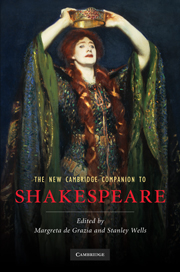Book contents
- Frontmatter
- 1 The traces of Shakespeare’s life
- 2 Shakespeare’s reading
- 3 Shakespeare’s writing: from manuscript to print
- 4 The theatre of Shakespeare’s London
- 5 The transmission of Shakespeare’s texts
- 6 Shakespeare and language
- 7 Shakespeare the poet
- 8 Shakespeare’s comedies
- 9 Shakespeare’s tragedies
- 10 Shakespeare’s English history plays
- 11 Shakespeare’s classical plays
- 12 Shakespeare’s tragicomedies
- 13 Shakespeare, religion and politics
- 14 Shakespeare and race
- 15 Shakespeare, sexuality and gender
- 16 Shakespeare on the stage
- 17 The critical reception of Shakespeare
- 18 Shakespeare and popular culture
- 19 Shakespeare and globalization
- 20 Shakespeare and media history
- 21 Shakespeare: reading on
- Index
6 - Shakespeare and language
Published online by Cambridge University Press: 28 January 2011
- Frontmatter
- 1 The traces of Shakespeare’s life
- 2 Shakespeare’s reading
- 3 Shakespeare’s writing: from manuscript to print
- 4 The theatre of Shakespeare’s London
- 5 The transmission of Shakespeare’s texts
- 6 Shakespeare and language
- 7 Shakespeare the poet
- 8 Shakespeare’s comedies
- 9 Shakespeare’s tragedies
- 10 Shakespeare’s English history plays
- 11 Shakespeare’s classical plays
- 12 Shakespeare’s tragicomedies
- 13 Shakespeare, religion and politics
- 14 Shakespeare and race
- 15 Shakespeare, sexuality and gender
- 16 Shakespeare on the stage
- 17 The critical reception of Shakespeare
- 18 Shakespeare and popular culture
- 19 Shakespeare and globalization
- 20 Shakespeare and media history
- 21 Shakespeare: reading on
- Index
Summary
When Shakespeare and his contemporaries thought about language, they thought of speech: breathy, ephemeral sounds cast into the air. This very ethereality was taken as a proof of one of the key Renaissance ideas about language: inasmuch as it allowed humans to make evident their ability to reason, it was a divine gift, distinguishing humanity from, and elevating it above, the rest of creation. The gift of language could raise the monstrous to the level of the human, as it does Caliban, and the voluntary abandonment of language suggested a descent: as when the arrogant Ajax, swollen with pride at the prospect of single combat with Hector, loses his ability to distinguish social rank, along with his humanity, to a mumbling silence:
thersites The man's undone for ever, for if Hector break not his neck i'th'combat he'll break't himself in vainglory. He knows not me. I said, 'Good morrow, Ajax', and he replies, 'Thanks, Agamemnon'. What think you of this man that takes me for the General? He's grown a very land-fish, languageless, a monster . . . he'll answer nobody. He professes not answering. Speaking is for beggars . . . He wears his tongue in's arms.
(Troilus and Cressida , 3.3.249-60)Language is social in the Renaissance in a formal, public sense we no longer quite appreciate: there is a clear link here between Ajax’s loss of language and his mistaking the lowly Thersites for the highest of the Greek generals. His loss of language is not complete: Ajax can still manage a dismissive ‘Thanks, Agamemnon’, and he can proudly declare that speaking is for beggars – but he has lost his reason, and therefore his membership of society. He is instead its laughing-stock.
- Type
- Chapter
- Information
- The New Cambridge Companion to Shakespeare , pp. 77 - 90Publisher: Cambridge University PressPrint publication year: 2010
- 7
- Cited by



